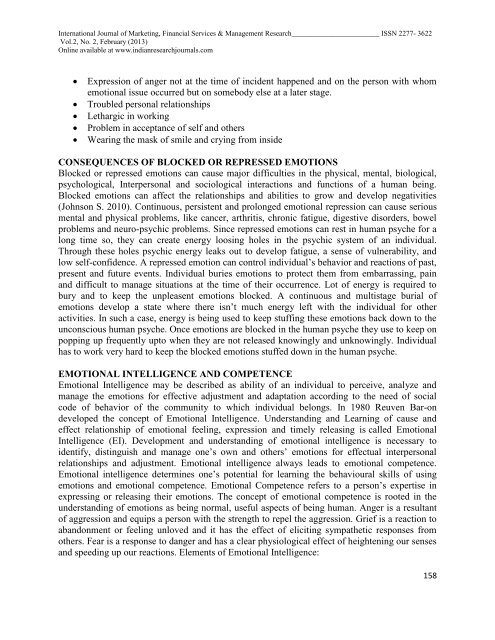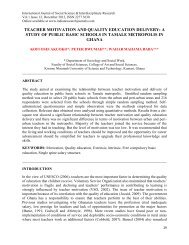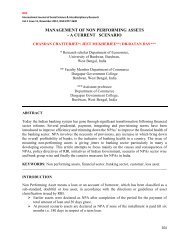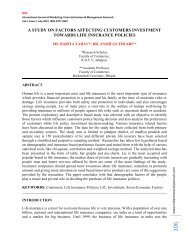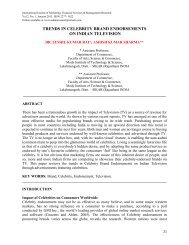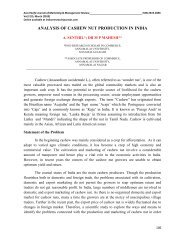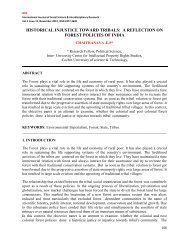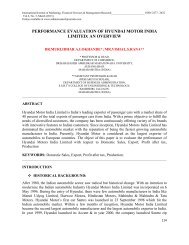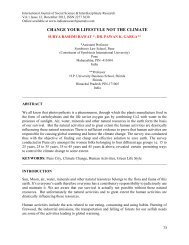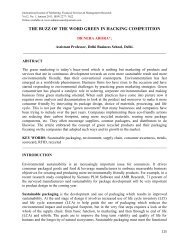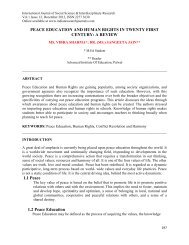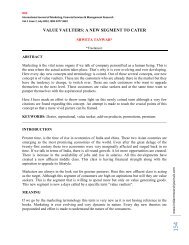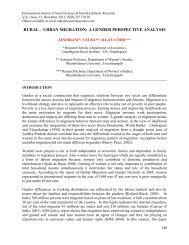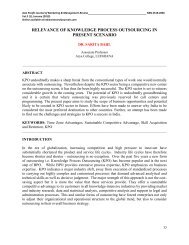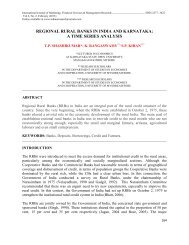blocked emotions - Indianresearchjournals.com
blocked emotions - Indianresearchjournals.com
blocked emotions - Indianresearchjournals.com
You also want an ePaper? Increase the reach of your titles
YUMPU automatically turns print PDFs into web optimized ePapers that Google loves.
International Journal of Marketing, Financial Services & Management Research________________________ ISSN 2277- 3622<br />
Vol.2, No. 2, February (2013)<br />
Online available at www.indianresearchjournals.<strong>com</strong><br />
<br />
<br />
<br />
<br />
<br />
Expression of anger not at the time of incident happened and on the person with whom<br />
emotional issue occurred but on somebody else at a later stage.<br />
Troubled personal relationships<br />
Lethargic in working<br />
Problem in acceptance of self and others<br />
Wearing the mask of smile and crying from inside<br />
CONSEQUENCES OF BLOCKED OR REPRESSED EMOTIONS<br />
Blocked or repressed <strong>emotions</strong> can cause major difficulties in the physical, mental, biological,<br />
psychological, Interpersonal and sociological interactions and functions of a human being.<br />
Blocked <strong>emotions</strong> can affect the relationships and abilities to grow and develop negativities<br />
(Johnson S. 2010). Continuous, persistent and prolonged emotional repression can cause serious<br />
mental and physical problems, like cancer, arthritis, chronic fatigue, digestive disorders, bowel<br />
problems and neuro-psychic problems. Since repressed <strong>emotions</strong> can rest in human psyche for a<br />
long time so, they can create energy loosing holes in the psychic system of an individual.<br />
Through these holes psychic energy leaks out to develop fatigue, a sense of vulnerability, and<br />
low self-confidence. A repressed emotion can control individual‟s behavior and reactions of past,<br />
present and future events. Individual buries <strong>emotions</strong> to protect them from embarrassing, pain<br />
and difficult to manage situations at the time of their occurrence. Lot of energy is required to<br />
bury and to keep the unpleasent <strong>emotions</strong> <strong>blocked</strong>. A continuous and multistage burial of<br />
<strong>emotions</strong> develop a state where there isn‟t much energy left with the individual for other<br />
activities. In such a case, energy is being used to keep stuffing these <strong>emotions</strong> back down to the<br />
unconscious human psyche. Once <strong>emotions</strong> are <strong>blocked</strong> in the human psyche they use to keep on<br />
popping up frequently upto when they are not released knowingly and unknowingly. Individual<br />
has to work very hard to keep the <strong>blocked</strong> <strong>emotions</strong> stuffed down in the human psyche.<br />
EMOTIONAL INTELLIGENCE AND COMPETENCE<br />
Emotional Intelligence may be described as ability of an individual to perceive, analyze and<br />
manage the <strong>emotions</strong> for effective adjustment and adaptation according to the need of social<br />
code of behavior of the <strong>com</strong>munity to which individual belongs. In 1980 Reuven Bar-on<br />
developed the concept of Emotional Intelligence. Understanding and Learning of cause and<br />
effect relationship of emotional feeling, expression and timely releasing is called Emotional<br />
Intelligence (EI). Development and understanding of emotional intelligence is necessary to<br />
identify, distinguish and manage one‟s own and others‟ <strong>emotions</strong> for effectual interpersonal<br />
relationships and adjustment. Emotional intelligence always leads to emotional <strong>com</strong>petence.<br />
Emotional intelligence determines one‟s potential for learning the behavioural skills of using<br />
<strong>emotions</strong> and emotional <strong>com</strong>petence. Emotional Competence refers to a person‟s expertise in<br />
expressing or releasing their <strong>emotions</strong>. The concept of emotional <strong>com</strong>petence is rooted in the<br />
understanding of <strong>emotions</strong> as being normal, useful aspects of being human. Anger is a resultant<br />
of aggression and equips a person with the strength to repel the aggression. Grief is a reaction to<br />
abandonment or feeling unloved and it has the effect of eliciting sympathetic responses from<br />
others. Fear is a response to danger and has a clear physiological effect of heightening our senses<br />
and speeding up our reactions. Elements of Emotional Intelligence:<br />
158


